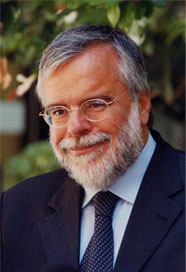
Andrea Riccardi was born in Rome in 1950. With a legal background (having graduated in law with a thesis on the relations between State and Church), he began his academic career at a very young age. He taught Contemporary History as a full professor at the University of Bari, Sapienza University, and the Third University of Rome.
Numerous universities have awarded him honorary degrees, including the Catholic University of Leuven (Belgium), Cardinal Herrera University – CEU in Valencia (Spain), Georgetown University in Washington (USA), Augsburg University (Germany), and Jean Moulin Lyon 3 University (France) (“for eminent services to peace and the University”).
Andrea Riccardi is also known internationally for having founded, in 1968, the Community of Sant’Egidio. In addition to its social commitment and its many development projects in the southern hemisphere, Sant’Egido is known for its commitment to favouring peace and dialogue. Andrea Riccardi played a role in mediating various conflicts and contributed to attaining peace in several countries, such as Mozambique, Guatemala and the Ivory Coast. In 2003, TIME magazine included him in their list of thirty-six “modern heroes” of Europe, individuals that stand out because of their professional courage and humanitarian commitment.
Appointed professor in 1981, Andrea Riccardi has taught at the University of Bari and at La Sapienza University in Rome. He is a well known scholar of the Catholic Church in modern times and of religion in general. Among his recent publications: Il secolo del martirio. I cristiani nel Novecento (‘The Century of Martyrdom. Christians in the 20th Century’, Milan 2000; translated and published in ten languages), Governo carismatico (‘Charismatic Government’, Milan 2003), Convivere (‘Living Together’, Rome-Bari 2006), Il “Partito romano” (‘The “Roman Party”‘, Brescia 2007).
L’inverno più lungo. 1943-44: Pio XII, gli ebrei e i nazisti a Roma, (‘The Longest Winter. 1943-44: Pius XII, Jews and Nazis in Rome’, Rome-Bari 2008) examines Rome through the Nazi occupation, highlighting the events involving the Jews and their persecutors against the backdrop of the entire complex situation of the city during World War 2, studying the role of collaborationists and silent witnesses, people frightened brave, as well as the Church.
In 2011 he published Giovanni Paolo II. La biografia (‘John Paul II. The Biography’, Cinisello Balsamo 2011, published also in French, Spanish, and Portuguese), which draws a comprehensive picture of the Pontiff as a key personality in the 20th Century, whose life epitomizes the history of the last century.
On 18th November 2004, he was given the International Balzan Prize for Humanity, Peace and Brotherhood among Peoples “for his commitment in reviving peaceful coexistence among different ethnic groups and promoting humanitarian action, peace and brotherhood among peoples – regardless of their religious creed – and especially for creating the DREAM programme combating AIDS and malnutrition in Mozambique, a concrete model for other struggling African countries”.
On 21st May 2009, he was awarded the Charlemagne Prize, which is assigned annually to public figures and institutions promoting a united Europe and contributing to spreading a culture of peace and dialogue. Over the years it has been given to eminent European statesmen, such as Alcide De Gasperi, Konrad Adenauer, Winston Churchill, Robert Schuman, Carlo Azeglio Ciampi and Angela Merkel. Andrea Riccardi is among the few non politicians to have received the prize. The motivation reads: “In tribute to his outstanding involvement for a humane Europe exemplifying solidarity inside and outside its borders, for understanding among peoples, cultures and religions, and for a more peaceful and just world.”
From November 16, 2011, to April 27, 2013, Andrea Riccardi served as Minister (without portfolio) for International Cooperation and Integration Policies in the technical government of Prof. Mario Monti (with responsibilities for family and equal opportunities).
Since 2015, he has been the President of the Dante Alighieri Society.